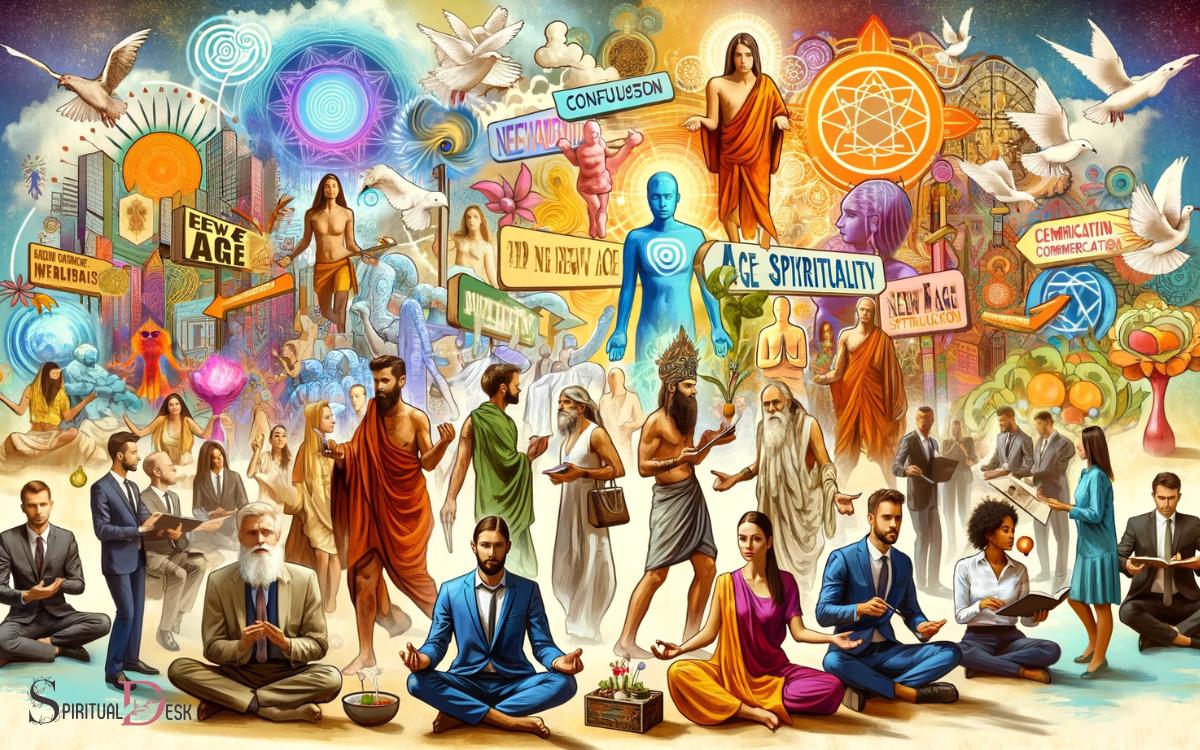The Problem with New Age Spirituality: Comprehensive Guide!
New Age Spirituality often blends various philosophies and practices, emphasizing personal spiritual development and holistic beliefs.
However, it faces criticism due to its eclectic approach, lack of doctrinal consistency, commercialization, and the potential for individuals to prioritize self-help over addressing systemic societal issues.
The issues with New Age Spirituality stem from several key concerns:
While seeking personal enlightenment, New Age Spirituality enthusiasts must be cautious not to overlook the depth of traditional practices or ignore the pressing collective challenges of our times.

Key Takeaway
8 Aspects: Problem with New Age Spirituality
| Aspect of New Age Spirituality | Description | Potential Issues |
|---|---|---|
| Eclectic Belief Systems | Adopts beliefs from various traditions without much discrimination. | Can lead to a superficial understanding and disrespect of the original contexts. |
| Commercialization | Spirituality turned into a marketable commodity with products and retreats. | Risks diluting spiritual practices into consumer experiences. |
| Overemphasis on Positivity | Encourages constant positivity and manifestation techniques. | May invalidate genuine emotions and struggle, leading to toxic positivity. |
| Self-focused Practices | Often centers on personal fulfillment and self-help. | Can neglect the importance of community and altruism in spiritual growth. |
| Disconnection from Tradition | Frequently ignores the deep roots and practices of traditional religions. | May result in a lack of depth and understanding in spiritual practices. |
| Lack of Critical Thinking | Sometimes discourages skepticism and encourages uncritical acceptance. | Can lead to gullibility and susceptibility to false teachings and scams. |
| Misappropriation | Cultural elements are often taken out of context and used inappropriately. | Can disrespect and harm the cultures from which they are borrowed. |
| Oversimplification | Complex spiritual concepts can be reduced to simple catchphrases or trends. | Leads to a misunderstanding of the complexities of spiritual life. |
Cultural Appropriation and New Age Practices

Cultural appropriation in new age practices has become a significant concern in the spiritual community.
The adoption of indigenous rituals, symbols, and practices by individuals from dominant cultures, often without understanding or respect for their original context, has stirred controversy.
Many argue that this appropriation reduces sacred traditions to mere trends, disregarding their cultural and spiritual significance.
It can perpetuate stereotypes, disrespect traditions, and undermine the struggles of marginalized communities. The commodification of spiritual practices can also lead to financial exploitation.
As the new age movement continues to grow in popularity, practitioners must approach spiritual traditions with reverence and understanding, to honor their origins, and to support the voices and autonomy of the cultures from which they are derived.
Commercialization of Spiritual Beliefs

The commercialization of spiritual beliefs within the new age movement has raised ethical concerns and provoked debates about the commodification of sacred practices and traditions.
This trend has led to several key issues:
- Exploitation of sacred knowledge and practices for financial gain, can devalue the authenticity and sanctity of these beliefs.
- Mass production and marketing of spiritual items and rituals, potentially reducing their significance to mere consumer goods.
- The potential for misinformation and misrepresentation of spiritual beliefs to cater to market demands.
- The impact on traditional spiritual communities, as commercialization may lead to the dilution or distortion of their cultural and religious practices.
These concerns highlight the need for careful consideration and ethical practices within the commercialization of spiritual beliefs.
Pseudoscience in New Age Teachings

With the rise of pseudoscience in new-age teachings, there is a growing concern about the dissemination of unfounded and unverified claims within spiritual practices.
Pseudoscience, which presents itself as scientific but lacks empirical evidence, has seeped into various aspects of new-age spirituality, leading to misconceptions and false beliefs.
This trend poses a significant challenge as it hampers the credibility of genuine spiritual practices and misguides individuals seeking enlightenment.
To highlight the impact of pseudoscience in new-age teachings, consider the following table:
| Issues Caused by Pseudoscience in New Age Teachings | Impact |
|---|---|
| Misinformation spread without scientific evidence | Misguides seekers |
| False claims of healing powers without empirical support | Endangers individuals� health |
| Exploitation of vulnerable individuals for monetary gain | Undermines trust in spiritual practices |
| Distortion of spiritual principles with unverified theories | Diminishes authenticity of teachings |
Lack of Critical Thinking and Discernment

Lacking critical thinking and discernment hinders the ability to discern between valid spiritual teachings and pseudoscientific claims.
In the realm of New Age spirituality, this lack of discernment can lead individuals to accept claims without evidence or critical evaluation. It is important to cultivate critical thinking skills to navigate the multitude of spiritual teachings and practices available.
Without this discernment, individuals may fall prey to misleading or potentially harmful ideologies. To address this issue, it is crucial to promote a culture of critical thinking within spiritual communities.
This can be achieved through educational initiatives, open dialogue, and encouraging individuals to question and evaluate information before accepting it as truth.
Impact of New Age Spirituality on Society

New Age spirituality influences societal beliefs and behaviors, shaping perspectives on wellness, success, and interpersonal relationships.
It promotes a focus on holistic well-being, encouraging individuals to seek spiritual and emotional fulfillment alongside physical health. This can lead to a positive impact by fostering a more compassionate and empathetic society.
However, the emphasis on individualism and personal fulfillment in New Age spirituality can also contribute to a self-centered mindset, potentially undermining the sense of community and collective responsibility.
Moreover, the pursuit of material success and personal happiness, often glorified in New Age teachings, may overshadow the importance of social justice and environmental sustainability.
Therefore, while New Age spirituality offers valuable insights, its impact on society warrants critical examination to ensure a balanced and inclusive approach to societal well-being.
Conclusion
The allure of new age spirituality is like a glittering mirage in the desert, enticing with promises of enlightenment and inner peace.
However, upon closer inspection, it reveals a landscape littered with cultural appropriation, commercialization, and pseudoscience.
Without critical thinking and discernment, society risks being led astray by the false promises of new age teachings. It is imperative to navigate this spiritual terrain with caution and skepticism, to avoid being lost in the illusions of the desert.






